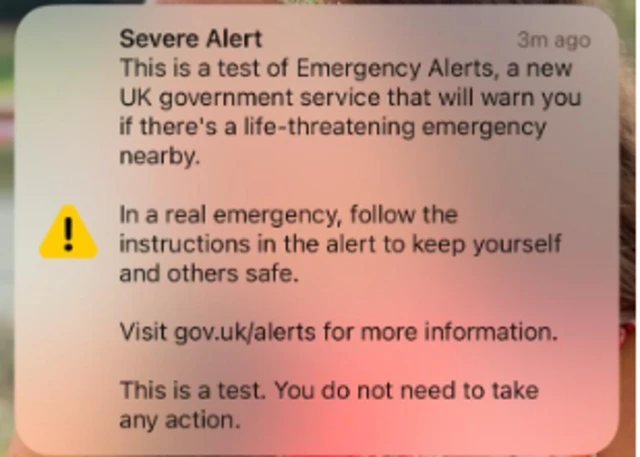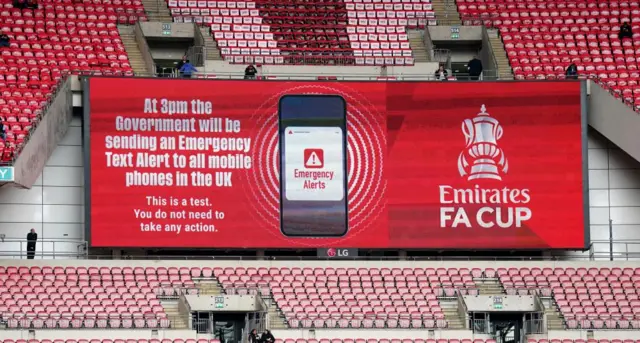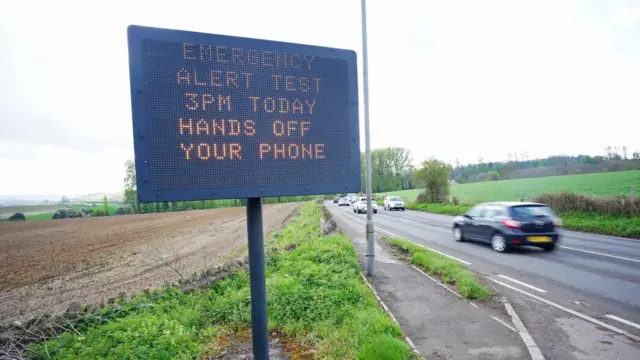And it's happening!published at 15:01 BST 23 April 2023

And there it goes... some of our phones in the newsroom sounded slightly early and not all of them were in sync!
A siren has sounded on smartphones across the UK as part of a government test of a system that will be used to warn of life-threatening emergencies
However, initial reports suggest many people didn't receive the alert and for some people it sounded earlier than expected
The Three network has said it is aware "that a number of customers" were affected and didn't receive the notification
It's designed to be used for serious weather-related events, such as severe flooding, fires and extreme weather and may also be used during terror attacks
Cabinet minister Oliver Dowden said it will be used only in situations where there was an immediate risk to life
The test had originally been planned for the early evening but was moved to avoid clashing with an FA Cup semi-final at Wembley Stadium, which kicks off at 16:30
Edited by Jeremy Gahagan

And there it goes... some of our phones in the newsroom sounded slightly early and not all of them were in sync!
We're now just seconds away and excitement is no doubt building across the UK.
The government says the alert will reach 90% of mobile phone users in the UK.
While it will work on all 4G and 5G phone networks, it will not include older "non-smart" phones.
Here's new Deputy Prime Minister Oliver Dowden telling Laura Kuenssberg earlier what the test in a couple of minutes will sound like.
Just like a fire alarm, test might be inconvenient - Deputy PM
 Image source, PA Media
Image source, PA MediaThe alert is fast approaching - and it's likely to reach most people who have a device which is switched on and connected to 4G and 5G networks.
That includes us journalists too - in fact we've just received a BBC-wide email warning colleagues not to take any mobile phones or tablets into studios that will be on air between 2.45 and 3.15pm.
A quick reminder that even if your phone is set to silent, expect to hear a very loud alert at 3pm.
Alistair Coleman
BBC Monitoring disinformation specialist
The UK-wide emergency alert test has provoked a number of untrue conspiracy theories, shared thousands of times on social media.
Many of these involve the fact it’s being sent via 4G and 5G phone masts, considered damaging or invasive within conspiracy circles.
There are claims that the test today will cause death or injury to millions of people. One tells people to avoid the test by heading out of towns and cities to “avoid the wave”.
Other theories claim it’s a government attempt to control your phone.
There are also claims that the alert is a signal to activate a dangerous pathogen already present in the Covid vaccine, making people sick.
None of these are true, and ignore the fact that these tests take place regularly around the world with no ill effects.
The government is strongly recommending people enable their phones to receive the alerts…but there are ways for users to opt out.
The easy way is to switch your device to airplane mode. Another way to avoid it is to search in settings for "emergency alerts" and turn off "severe alerts" and "extreme alerts".
We'd love to hear from you

We know the emergency alert test is coinciding with a number of public events this afternoon, including the London Marathon and some Premier League football matches.
But where will you be when the emergency alarm sounds? Are you in a remote spot, or will you be in a shopping centre or a theatre? Maybe you’ve opted out of receiving the alert entirely.
We’d love to hear from you. Please share your comments on the new system, and your pictures and videos of the alert test, by emailing haveyoursay@bbc.co.uk, external
You can also get in touch in the following ways:
Please read our terms & conditions and privacy policy. In some cases a selection of your comments and questions will be published, displaying your name and location as you provide it unless you state otherwise. Your contact details will never be published.
 Image source, PA Media
Image source, PA MediaWembley warns of the alert ahead of the FA Cup semi-final between Brighton and Man Utd later this afternoon
We're under 20 minutes away and #emergencyalerts is trending in the UK on Twitter. There's a lot of people using it to spread conspiracy theories or encourage other people to turn their emergency alert settings off.
Others are speculating on what it will sound like.
One Twitter user posted: "I literally know this emergency alert is coming at 3pm and yet I’m still sat here nervous because I know I’m gonna get the absolute beejezus scared out of me."
BBC Match of the Day commentator Connor McNamara has tweeted that the emergency alert test is due to trigger during half time at Newcastle United's stadium St James Park.
He tweeted: "Kind of intrigued what it’s going to sound like to hear 52,000 phones all siren at the same time" followed by a gif saying: "I'm thinking very very loud".
Some organisations have criticised the nature of the test. This includes domestic abuse campaigners who have warned the alert could give away the location of secret devices kept by victims.
People at risk of abuse have been advised to turn off any mobile device they want to keep hidden so they cannot be discovered by an abuser as the alert can still sound if a phone is kept on silent.
Emma Pickering, senior operations tech abuse manager at Refuge, says: "Our concerns are centred on the very real risk to survivors of domestic abuse who may have secret or secondary phones hidden within the home, which they must ensure are not discovered by their perpetrators.
"These devices can be a lifeline for women who need to access support or flee their abuser."
It is possible to turn the alerts off, something domestic abuse charity Refuge is advising vulnerable people how to do, external ahead of the test.
The government has also stressed phones will not make the sound if they are in airplane mode or switched off.
At 3pm, a message will appear on the home screens of people's devices during the test, with vibration and a loud warning sound that will ring for about 10 seconds, even if the phone is set to silent.
Phone users will have to acknowledge the alert before they can use other features on their devices.
In addition to our live text blog, you’ll be able to watch special BBC News coverage of the unique event with reporters chipping in with reaction from around the UK.
You’ll be able to watch this live by clicking the play button at the top of this page from 2.30pm.
In a nutshell, yes.
People who have their phones switched off or on airport mode will not receive the message - but it will sound if your phone is switched to silent.
So for those of you catching any matinee theatre performances today, be warned!
 Image source, Reuters
Image source, ReutersSouth Korea’s mobile notification system was used early in the Covid pandemic
While planning for the UK’s emergency alerts system has been ten years in the making, other countries - such as France, the US and Japan - have used them for years.
But the rollouts haven’t always gone so smoothly.
In Canada, government agencies can issue alerts to mobile phones for the likes of natural disasters and public health issues.
Back in 2015, residents in the Canadian province of Manitoba were incensed by an alert warning of an impending tornado. They complained the alert’s garbled recording was so nonsensical that it mispronounced the names of the locations in the tornado’s wake.
South Korea’s first nationwide mobile notification system was adopted in 2005 and is used to issue warnings about disasters and to provide guidelines in emergency situations - including the Covid pandemic.
In the early stages, residents were notified on a daily basis on the number of new cases in their area as well as contact tracing information on virus carriers to prevent the spread of the disease.
But people grew weary of the alerts system, criticising the excessive amount of messages.
According to the interior ministry, over 145,000 Covid-related text alerts were sent nationwide by the central and local authorities for three years between 2020 and 2022, Korea Times, external reported.
Experts have argued that if there are too many alerts, receivers might get fatigued, making them less likely to respond to a disaster.
 Image source, PA Media
Image source, PA MediaPlay will pause before the alert at the World Snooker Championship in Sheffield
Today’s test is happening on St George's Day - when England’s patron saint is celebrated.
It also coincides with some major events including the London Marathon and Premier League games between Bournemouth and West Ham, and Newcastle and Tottenham Hotspur, which kick off at 2pm.
Organisers of the World Snooker Championship have said they will pause play just before 3pm at the Crucible in Sheffield and will continue it after the alert.
The Society of London Theatre also said it had advised members to tell people to turn off their phones to "minimise disruption to shows".
West End shows such as Harry Potter And The Cursed Child, Frozen, Mamma Mia! and The Lion King are among those putting on matinees on Sunday.
 Image source, PA Media
Image source, PA MediaThe emergency alert being tested today could be the sound that “saves your life” - that’s according to the newly-appointed deputy PM, Oliver Dowden.
Dowden has been doing the media rounds this morning, reassuring people they should not be concerned and will be able to "keep calm and carry on" with their day after getting the test alert on their 4G and 5G devices.
He said: "The government's number one job is to keep people safe and this is another tool in the toolkit for emergency situations, such as flooding or wildfires, and where there is a genuine risk to life.
"So it really is the sound that could save your life.
"I would encourage people to remember that today it is just a test; there is no need to take any action and you can simply swipe it away as you would any other message you receive."
You can read more in this story here.
 Jeremy Gahagan
Jeremy Gahagan
BBC News Live reporter
 Image source, PA Media
Image source, PA MediaHello and welcome to our coverage as we await the government's new emergency alert system - due to sound on nearly every smartphone in the UK this afternoon at 3pm.
The idea is that in the future the alert will be used to warn of extreme weather events, such as flash floods or wildfires, and may even be used during terror incidents.
Deputy Prime Minister Oliver Dowden says the alert could be the sound that “saves your life”.
All 4G and 5G Android and Apple phones are fitted with emergency alert capability and similar systems are in use in other countries, including the US, Canada, Japan and the Netherlands.
My colleagues and I are here at BBC Broadcasting House and we’ll guide you through details of the test and will provide reaction from around the country once the alert sounds.